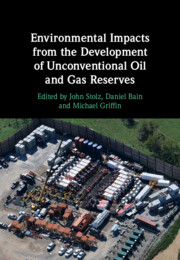Book contents
- Environmental Impacts from the Development of Unconventional Oil and Gas Reserves
- Environmental Impacts from the Development of Unconventional Oil and Gas Reserves
- Copyright page
- Contents
- Figures
- Tables
- Contributors
- Preface
- Part I Overview
- 1 Global Unconventional Oil and Gas Reserves and Their Development
- 2 Unconventional Shale Gas and Oil Extraction in the Appalachian Basin
- 3 An Overview of Unconventional Gas Extraction in Australia
- 4 The Governance of Fracking
- Part II Environmental Analysis
- Part III Case Studies
- Index
- References
4 - The Governance of Fracking
History, Differences, and Trends
from Part I - Overview
Published online by Cambridge University Press: 28 July 2022
- Environmental Impacts from the Development of Unconventional Oil and Gas Reserves
- Environmental Impacts from the Development of Unconventional Oil and Gas Reserves
- Copyright page
- Contents
- Figures
- Tables
- Contributors
- Preface
- Part I Overview
- 1 Global Unconventional Oil and Gas Reserves and Their Development
- 2 Unconventional Shale Gas and Oil Extraction in the Appalachian Basin
- 3 An Overview of Unconventional Gas Extraction in Australia
- 4 The Governance of Fracking
- Part II Environmental Analysis
- Part III Case Studies
- Index
- References
Summary
This chapter examines the history of fracking as a new technology for enhancing the production of oil and gas, looking for explanations of why the practice is restricted or banned in some jurisdictions but permitted and fostered in others. The classic risk-perception paradigm, which emphasizes the role of public opinion, the mass media, and grass-roots activism, provides useful insight into how and why fracking was banned first in France and later in the UK. Risk perception provides less insight into why fracking is generally acceptable in some states of the US but not in others. Several contextual factors favoring fracking in the US are explored: private ownership of mineral rights and royalty policies, favorable state regulatory climates, a national interest in energy security, and vocal support of fracking from national political leaders of both parties. We look at fracking governance in Texas, North Dakota and Pennsylvania, where fracking technologies are treated as acceptable extensions of conventional technologies and where the practice is neither widely feared nor stigmatized. These states appreciate the benefits of employment and tax revenue fracking operations stimulate.
- Type
- Chapter
- Information
- Publisher: Cambridge University PressPrint publication year: 2022

